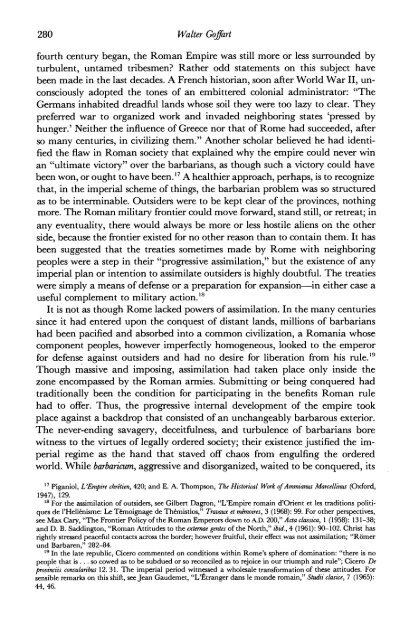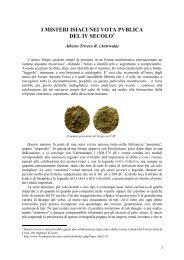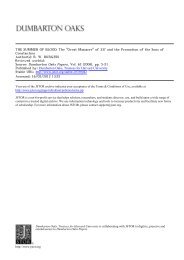Rome, Constantinople, and the Barbarians - Constantine the Great
Rome, Constantinople, and the Barbarians - Constantine the Great
Rome, Constantinople, and the Barbarians - Constantine the Great
Create successful ePaper yourself
Turn your PDF publications into a flip-book with our unique Google optimized e-Paper software.
280 Walter Goffart<br />
fourth century began, <strong>the</strong> Roman Empire was still more or less surrounded by<br />
turbulent, untamed tribesmen? Ra<strong>the</strong>r odd statements on this subject have<br />
been made in <strong>the</strong> last decades. A French historian, soon after World War II, unconsciously<br />
adopted <strong>the</strong> tones of an embittered colonial administrator: "The<br />
Germans inhabited dreadful l<strong>and</strong>s whose soil <strong>the</strong>y were too lazy to clear. They<br />
preferred war to organized work <strong>and</strong> invaded neighboring states 'pressed by<br />
hunger.' Nei<strong>the</strong>r <strong>the</strong> influence of Greece nor that of <strong>Rome</strong> had succeeded, after<br />
so many centuries, in civilizing <strong>the</strong>m." Ano<strong>the</strong>r scholar believed he had identified<br />
<strong>the</strong> flaw in Roman society that explained why <strong>the</strong> empire could never win<br />
an " ultimate victory" over <strong>the</strong> barbarians, as though such a victory could have<br />
been won, or ought to have been. 17 A healthier approach, perhaps, is to recognize<br />
that, in <strong>the</strong> imperial scheme of things, <strong>the</strong> barbarian problem was so structured<br />
as to be interminable. Outsiders were to be kept clear of <strong>the</strong> provinces, nothing<br />
more. The Roman military frontier could move forward, st<strong>and</strong> still, or retreat; in<br />
any eventuality, <strong>the</strong>re would always be more or less hostile aliens on <strong>the</strong> o<strong>the</strong>r<br />
side, because <strong>the</strong> frontier existed for no o<strong>the</strong>r reason than to contain <strong>the</strong>m. It has<br />
been suggested that <strong>the</strong> treaties sometimes made by <strong>Rome</strong> with neighboring<br />
peoples were a step in <strong>the</strong>ir "progressive assimilation," but <strong>the</strong> existence of any<br />
imperial plan or intention to assimilate outsiders is highly doubtful. The treaties<br />
were simply a means of defense or a preparation for expansion-in ei<strong>the</strong>r case a<br />
useful complement to military action.I8<br />
It is not as though <strong>Rome</strong> lacked powers of assimilation. In <strong>the</strong> many centuries<br />
since it had entered upon <strong>the</strong> conquest of distant l<strong>and</strong>s, millions of barbarians<br />
had been pacified <strong>and</strong> absorbed into a common civilization, a Romania whose<br />
component peoples, however imperfectly homogeneous, looked to <strong>the</strong> emperor<br />
for defense against outsiders <strong>and</strong> had no desire for liberation from his rule.'9<br />
Though massive <strong>and</strong> imposing, assimilation had taken place only inside <strong>the</strong><br />
zone encompassed by <strong>the</strong> Roman armies. Submitting or being conquered had<br />
traditionally been <strong>the</strong> condition for participating in <strong>the</strong> benefits Roman rule<br />
had to offer. Thus, <strong>the</strong> progressive internal development of <strong>the</strong> empire took<br />
place against a backdrop that consisted of an unchangeably barbarous exterior.<br />
The never-ending savagery, deceitfulness, <strong>and</strong> turbulence of barbarians bore<br />
witness to <strong>the</strong> virtues of legally ordered society; <strong>the</strong>ir existence justified <strong>the</strong> imperial<br />
regime as <strong>the</strong> h<strong>and</strong> that staved off chaos from engulfing <strong>the</strong> ordered<br />
world. While barbaricum, aggressive <strong>and</strong> disorganized, waited to be conquered, its<br />
17 Piganiol, LEmpire chretien, 420; <strong>and</strong> E. A. Thompson, The Historical Work of Ammianus Marcellinus (Oxford,<br />
1947), 129.<br />
18 For <strong>the</strong> assimilation of outsiders, see Gilbert Dagron, "L'Empire romain d'Orient et les traditions politiques<br />
de l'Hellenisme: Le Temoignage de Thremistios," Travaux et memoires, 3 (1968): 99. For o<strong>the</strong>r perspectives,<br />
see Max Cary, "The Frontier Policy of <strong>the</strong> Roman Emperors down to A.D. 200," Acta classica, 1 (1958): 131-38;<br />
<strong>and</strong> D. B. Saddington, "Roman Attitudes to <strong>the</strong> exterae gentes of <strong>the</strong> North," ibid., 4 (1961): 90-102. Christ has<br />
rightly stressed peaceful contacts across <strong>the</strong> border; however fruitful, <strong>the</strong>ir effect was not assimilation; "<strong>Rome</strong>r<br />
und Barbaren," 282-84.<br />
19 In <strong>the</strong> late republic, Cicero commented on conditions within <strong>Rome</strong>'s sphere of domination: "<strong>the</strong>re is no<br />
people that is .. . so cowed as to be subdued or so reconciled as to rejoice in our triumph <strong>and</strong> rule"; Cicero De<br />
provinciis consularibus 12. 31. The imperial period witnessed a wholesale transformation of <strong>the</strong>se attitudes. For<br />
sensible remarks on this shift, see Jean Gaudemet, "L'ttranger dans le monde romain," Studii clasice, 7 (1965):<br />
44, 46.







